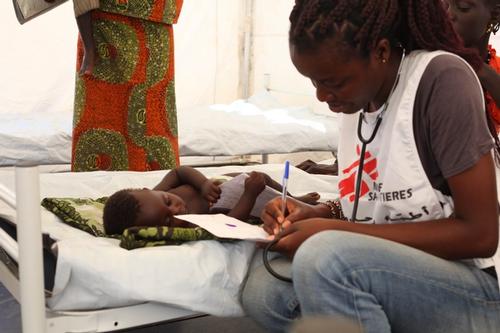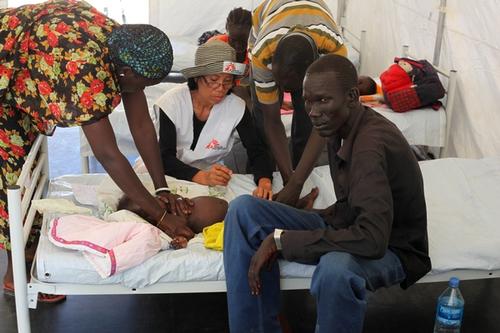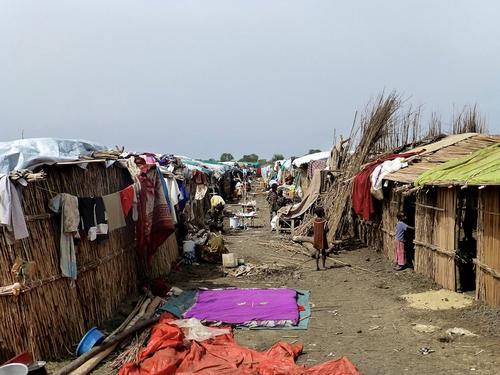Christine Bimansha, a medical doctor from Congo, is one of MSF’s experienced emergency staff in South Sudan. She is currently working with the MSF team in the capital Juba, providing medical care in two UN (UNMISS) bases where 35,000 people have sought safety following a wave of violence.
“I am currently working in an MSF mobile clinic in a UNMISS camp in Juba – this is the UN camp where a lot of people have gathered, probably 15,000 people. Another 20,000 are gathered in another UN camp in the city, about 35,000 people in total. The population density in the camps is very high – our field coordinator calculated that it is up to ten times more than Mumbai!
The situation in Juba is back to a relative calm for the moment, we can move, even if there is a curfew we can move around, but for the national people, people from the Nuer community in particular, they’re scared to go out. Even in the UN camp, especially the men, they don’t move out - the women will go in and out, but only during the day.
In the camp we have set up a clinic, with a triage area, a consultation area with four of us doing consultations and a small observation room with four beds which is looked after by a nurse. Everyday we have around 210, 220 consultations – today it was 235. At the moment in the clinic we are having a lot of diarrhoea and dehydration, today almost half our patients had diarrhoea – it’s the main issue in the clinic and in all the camp and it’s because of the sanitation problems there.
Water and sanitation biggest problem
Water and sanitation is the biggest problem the displaced people are facing – they don’t have access to water or to enough latrines. The little food they have is the food they brought with them from home. Some food distributions have now started but this is not enough for all the displaced. Those who have some money can still buy some food but the other people are hungry.
Organizations supposed to provide water to the displaced people are talking and looking about this, but it’s been almost two weeks now that people have been there and they only started building the latrines a few days ago. There are some water points but until a few days ago the water wasn’t treated and there isn’t a sufficient amount for people. Definitely it is not enough, in either quantity or quality. If the water and sanitation conditions at the UNMISS camp remain the same the situation will get worse – if people don’t have water and we have an explosion of diseases like cholera then that will be a big outbreak and a big problem. Measles is also a significant threat and an outbreak would be difficult to stop in such overcrowded conditions.
Severe diarrhea
There are a couple of patients that stick in my mind. The first was an adult with severe watery diarrhea. He was a tall man of about 28 years old with severe dehydration, and his diarrhea was very bad, it was going straight on the floor, he couldn’t control it or stand up, and he felt so ashamed, he was almost crying because he couldn’t stop it. I remember that but after some treatment he got better and went back home so that was good. And there was a small baby girl, about 8-9 months old, completely lethargic, almost comatose with severe dehydration. But we couldn’t find an IV line for her so we were pushing for the mother to put some ORS (oral rehydration salts) direct in the mouth of her baby. And after about 30 minutes the child started opening her eyes. The mother couldn’t believe that just ORS could save the life of her child and she was amazed and left happy.
I was in South Sudan in 2011, in Pibor, when the MSF clinic was looted and closed. And I work in the Emergency Pool for MSF so I often work in places that are insecure and where there is no peace. In this country things are not going well. On top of the political violence, there are a lot of tensions between the different communities. Many aid organizations have pulled out their staff and suspended their programmed in the country. In MSF we have reduced the regular team to essential staff but we have also brought in some experienced people to help manage our emergency response here. These people need assistance, more than ever.”






